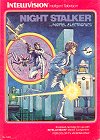
 The Game: You’re alone, unarmed, in a maze full of bats, bugs and ‘bots, most of whom can kill you on contact (though the robots would happily shoot you rather than catching up with you). Loaded guns appear periodically, giving you a limited number of rounds with which to take out some of these creepy foes, though your shots are best reserved for the robots and the spiders, who have a slightly more malicious intent toward you than the bats. If you shoot the bats, others will appear to take their place. If you shoot the ‘bots, the same thing happens, only a faster, sharper-shooting model rolls out every time. Your best bet is to stay on the move, stay armed, conserve your firepower – and don’t be afraid to head back to your safe room at the center of the screen. (Mattel Electronics, 1982)
The Game: You’re alone, unarmed, in a maze full of bats, bugs and ‘bots, most of whom can kill you on contact (though the robots would happily shoot you rather than catching up with you). Loaded guns appear periodically, giving you a limited number of rounds with which to take out some of these creepy foes, though your shots are best reserved for the robots and the spiders, who have a slightly more malicious intent toward you than the bats. If you shoot the bats, others will appear to take their place. If you shoot the ‘bots, the same thing happens, only a faster, sharper-shooting model rolls out every time. Your best bet is to stay on the move, stay armed, conserve your firepower – and don’t be afraid to head back to your safe room at the center of the screen. (Mattel Electronics, 1982)
Memories: A devious and nerve-wracking little maze chase of a game, Night Stalker is a great game if you’re up for an endurance contest, but not so much if you’re looking for a game where you actually stand a chance of winning or advancing to a new maze. The playing field you see is the playing field you get, and you’re stuck there – until you die.
That playing field is also, for all intents and purposes, very nearly an iconic image in early video game marketing; Night Stalker being one of the earliest (and best) non-sports action games on the Intellivision, its marketing screen shot was a frequent flyer in advertisements for the system.

 Original plans for the game called for a spider to emerge from the maze, leaving a web trail that would slow the player down (but not the robots or bats, of course), but it was scrapped when a young playtester visiting Mattel’s offices proved even handier than the game’s designers at being able to vanquish the never-ending onslaught of robots. The web feature was left on the video game equivalent of the cutting room floor, replaced by more
Original plans for the game called for a spider to emerge from the maze, leaving a web trail that would slow the player down (but not the robots or bats, of course), but it was scrapped when a young playtester visiting Mattel’s offices proved even handier than the game’s designers at being able to vanquish the never-ending onslaught of robots. The web feature was left on the video game equivalent of the cutting room floor, replaced by more  varieties of robots, including invisible robots and a black one whose shots could chip away at the integrity of the “safe room.” The web was pitched as a key feature of a potential sequel which never happened.
varieties of robots, including invisible robots and a black one whose shots could chip away at the integrity of the “safe room.” The web was pitched as a key feature of a potential sequel which never happened.
